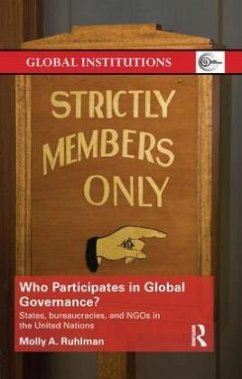
Millennium Development Goals
Ideas, Interests and Influence
Versandkostenfrei!
Versandfertig in 6-10 Tagen
43,99 €
inkl. MwSt.
Weitere Ausgaben:

PAYBACK Punkte
22 °P sammeln!
Heralded as a success that mobilized support for development, the Millennium Development Goals (MDGs) ushered in an era of setting development agendas by setting global goals. This book critically evaluates the MDG experience from the capabilities and human rights perspectives, and questions the use of quantitative targets as an instrument of global governance. It provides an account of their origins, trajectory and influence in shaping the policy agenda, and ideas about international development during the first 15 years of the 21st century. The chapters explore:- whether the goals are adequa...
Heralded as a success that mobilized support for development, the Millennium Development Goals (MDGs) ushered in an era of setting development agendas by setting global goals. This book critically evaluates the MDG experience from the capabilities and human rights perspectives, and questions the use of quantitative targets as an instrument of global governance. It provides an account of their origins, trajectory and influence in shaping the policy agenda, and ideas about international development during the first 15 years of the 21st century. The chapters explore:
- whether the goals are adequate as benchmarks for the transformative vision of the Millennium Declaration;
- how the goals came to be formulated the way they were, drawing on interviews with key actors who were involved in the process;
- how the goals exercised influence through framing to shape policy agendas on the part of both developing countries and the international community;
- the political economy that drove the formulation of the goals and their consequences on the agendas of the South and the North;
- the effects of quantification and indicators on ideas and action; and
- the lessons to be drawn for using numeric goals to promote global priorities.
Representing a significant body of work on the MDGs in its multiple dimensions, compiled here for the first time as a single collection that tells the whole definitive story, this book provides a comprehensive resource. It will be of great interest to students, researchers and policymakers in the fields of development, human rights, international political economy, and governance by numeric indicators.
- whether the goals are adequate as benchmarks for the transformative vision of the Millennium Declaration;
- how the goals came to be formulated the way they were, drawing on interviews with key actors who were involved in the process;
- how the goals exercised influence through framing to shape policy agendas on the part of both developing countries and the international community;
- the political economy that drove the formulation of the goals and their consequences on the agendas of the South and the North;
- the effects of quantification and indicators on ideas and action; and
- the lessons to be drawn for using numeric goals to promote global priorities.
Representing a significant body of work on the MDGs in its multiple dimensions, compiled here for the first time as a single collection that tells the whole definitive story, this book provides a comprehensive resource. It will be of great interest to students, researchers and policymakers in the fields of development, human rights, international political economy, and governance by numeric indicators.













